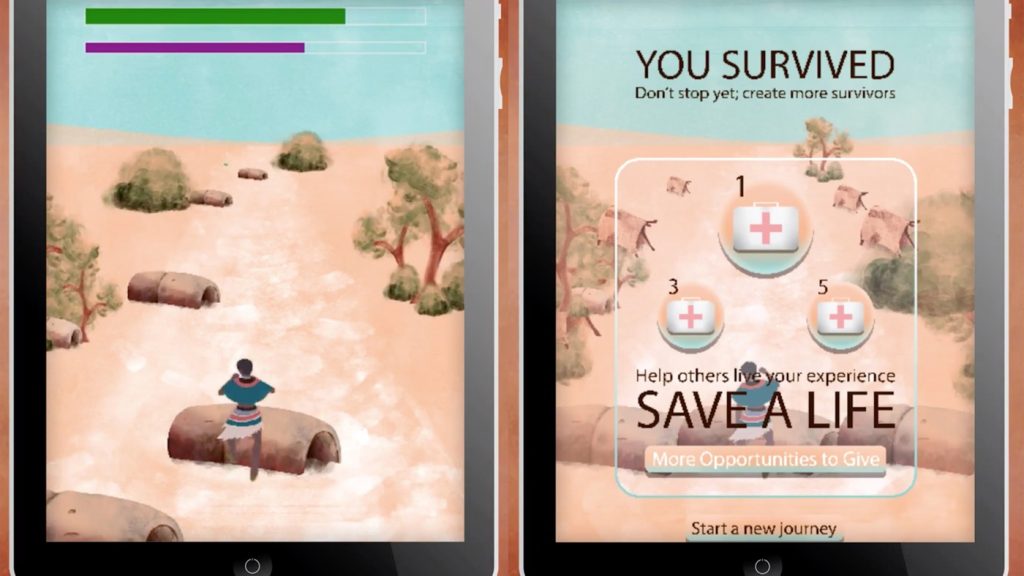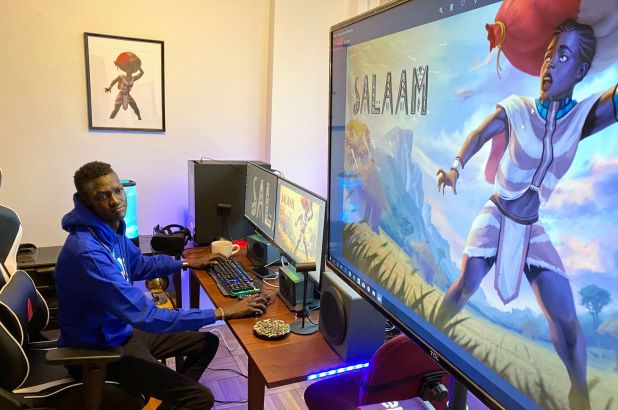Have you ever played Grand Theft Auto, also known as GTA?
GTA is a multi-character action packed game based in an urban environment usually resembling real life locations in the United Sates of America.
You can live a virtual life in this series of GTA games. It involves violence, theft and robbery, damaging property, bloodshed, and it involves gun battles. GTA has a mature-rating and is not suitable for young players. Others, however use this to release tension and relax.
For a young person who never played a video game, to pick GTA as his first, there were two possible outcomes for such an experience. Either he felt mocked by the violence due to his refugee status or gained inspiration to create something different to GTA.
Lual Mayen picked the latter.
“When I was playing the game it actually reminded me of my country. Not because the game is too violent but because the game had things I could see like killing and robbery, which were happening in my country,” he says.
After playing GTA on a computer Lual wanted to create a video game; a video game depicting refugee life without the violence usually attributed to war zones.
“I thought since games are powerful and if kids like me from my country, a country that has 73% of the population under 30 years old, born and raised during war times, played a game, they would think that’s how things are done.”
“I wanted to create a video game that can teach people empathy, peace and conflict resolution and I was like I don’t know what it takes and I want to learn. That’s where I got the inspiration. I never knew anything about the gaming industry. I was like, I just want to make something that would bring the people together, have kids in a refugee camp, have something kids can use to entertain themselves. But it doesn’t involve killing and violence,” Lual said.
Life in a refugee camp
Before he discovered his goal however, Lual’s family fled South Sudan for a refugee camp in the early 2000s. In fact, Lual was born on the way to the refugee camp. This was his reality.
“I remember our home was near the river so we could go and swim and cross over the river to get food to eat on the other side. There were mangoes, and that was what we could use to live a day.
There wasn’t enough food at all. It was so bad. I remember in 2005 some of the children would go to the mango tree and fall out and some of them died on the spot. The next day we couldn’t even do anything.
We just went back to eat the same thing because we wanted to survive,” he narrated.
Lual’s his father became ill while in the refugee camp. His two brothers were born in the camp. His sister couldn’t make the full journey to the refugee camp. All rested on his mother’s shoulders to take care of the family.
“It’s a God giving opportunity to be able to take care of your family,”Lual’s mother added.

Lual strongly admires the woman who gave him an opportunity to live a comfortable life she could give in the camp – his mother.
“I would remember she would go over to the bush, get some leaves so she could sell some them to people we were living with in the refugee camp because my father was not feeling right.”
“She took care of everything a man could do.”
In the evening, Lual made puppets out of any material he could find for a puppet show to entertain his friends, family and the rest of the community.
“Over 100 people will come to my house and people will come there every time unless it’s raining, he laughed.
His mother describes him as not ‘being like other children in the camp’.
“When he was alone, he would always create something for himself,” she said.
‘It was a crazy thing to ask my mother for a computer’
To create the game, Lual needed a computer.
Displacement during the South Sudanese civil war was a difficult time for people fleeing their beloved country. They left houses behind, left life essentials like water and food supplies behind to call a foreign and unfamiliar country ‘home’.
Life became extremely difficult. Lives drastically changed.
So the thought of acquiring a computer in a refugee camp came as an absurd thought to Lual but in his heart, he wished for one after sighting a computer in 2007, at the age of 13, in the camp.
“In 2010 I asked my mother for a computer and she looked at me saying ‘there’s no money for us to buy, there’s no power for us to charge but because she was a mother she didn’t take it to heart and be like, ‘you are crazy, why do you ask this?’.”
For the love of her child, determination in his eyes, and beaming will power, Lual’s mother saved up money from 2010 to 2013 to buy him a laptop he could use to practice coding to achieve his goal.
She says, “you’re supported when people see what you’re capable of doing”. So buying a computer would be another next step for her to do in her son’s life to enable him to do something bigger than what he was doing during that time.
The next hurdle for Lual was to find a place to charge his laptop
“I started teaching myself coding, teaching myself some graphics, making sure I could teach myself how to make games and everyone in the camp was like wow, what are you doing? My computer was always in my backpack. That’s what I did, whenever you see me, everywhere I took it with me.
To me, this was all I had, so I would start working harder, training myself and I remember making my first version of Salaam and everyone thought I was crazy. They were asking, ‘how did you do this?’ and they loved playing it.”
Life after peace

After great feedback from his community and family, Lual decided he wanted more people to play Salaam. He took to Facebook and uploaded a picture of it to his profile and told the world about it.
The gaming industry took notice and reached out to him in the refugee camp.
Now living in Washington DC, and his family in Canada, life is different. It has changed for the better.
“It’s amazing here because we always have resources that we did not have in the refugee camp. That I could be able to use my skill for my future and grow and create something new in the industry and be able to work with amazing people. I miss my mother’s cooking, now I pay rent – it’s a big change of life and culture.”
Salaam launched under Junub Games at the Game Awards which recognised Global Gaming Citizens like Lual Mayen, in December 2019. Salaam officially comes out to the public this summer.














